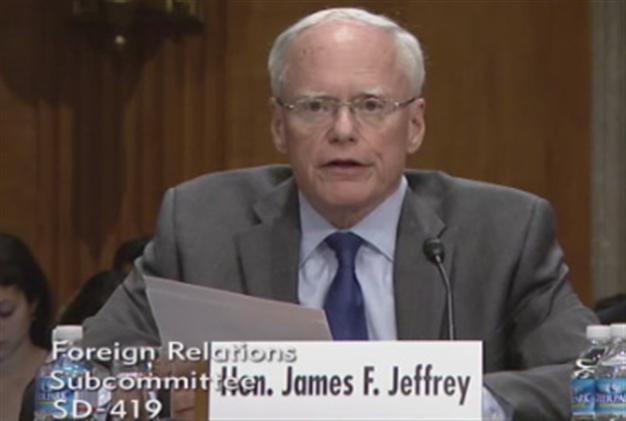US Senate discusses Gezi Park protests
WASHINGTON

James Jeffrey, former U.S. ambassador to Ankara, speaks during the panel.
The U.S. Senate discussed Turkey’s Gezi Park protests in a panel at the Committee on Foreign Relations on July 31.
Attendance at the panel, titled “Where is Turkey headed? Gezi Park, Taksim Square, and the Future of the Turkish Model,” was reportedly high, days before Congress heads for its summer break.
The participants were Kurt Volker, the executive director of McCain Institute and former NATO ambassador, James Jeffrey, former U.S. ambassador to Ankara, Robert Wexler, the head of the S. Daniel Abraham Center for Middle East Peace and Jenny B. White, a professor at Boston University.
Volker said a much more proactive United States policy should be applied to Turkey, “on the one hand to work with Turkey strategically to address challenges in the region, which are of great concern to Turkey and should be of great concern to the United States as well.”
“On the other hand, to be clear, candid, and public about our deep commitment to democratic values and institutions, and our concern that Turkey should reverse its drift away from these values, both for its own stability, as well as for its ability to play a constructive role in the region,” he added.
The United States has repeatedly cautioned Turkish authorities against seeking to punish any demonstrators merely for exercising their right to free speech during Gezi Park protests.
‘Sizable new constituency has emerged during Gezi protests’James Jeffrey, former U.S. ambassador to Ankara, said Washington’s goal should be encourage Turkey to resolve splits in peaceful ways. “Our goal should thus be to do whatever is in our power, mainly privately and without antagonizing, to ensure that a complete and honest debate takes place in Turkey and to encourage the Turks to resolve the serious splits in their society in a democratic, peaceful manner,” the former ambassador said. “This is not only an end in itself for a more successful, more stable Turkey, but is also essential if we want to continue to work effectively with Turkey on the huge range of problems we face together in the broader Middle East and more widely in Eurasia,” he said.
Jenny B. White, a professor at Boston University who specializes in Turkish affairs, said the most important outcome of the Gezi protests was that a sizable new constituency had emerged, as yet with no name, no platform, and no leader.
“It is the first time in Turkish history that such a mass of people, many with contradictory or competing interests, have come together without any ideological or party organization. They cross class boundaries and bridge the left and right, conservative and liberal, pious and secular,” she said.
“Despite government claims that there is an international cabal steering them, the protesters are out there to air a wide variety of complaints, but central is their demand that an elected government must also protect the rights of the people who did not vote for them, the rights of minorities, the rights of people whose ideas or lifestyle the electoral winners might not agree with,” White said.
